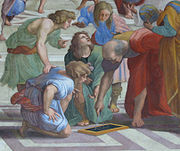
Clayton Chrusch makes some very acute observations, reminding me of the closing pages of the Anatomy where Frye draws the analogy between the language of mathematics and the language of literature: “The mathematical and the verbal universes are doubtless different ways of conceiving of the same universe” (Anatomy, 354, Princeton edition). Here are Clayton’s comments:
Skimming through the essay [“The Dialectic of Belief and Vision”], I came across this sentence which seems like a justification or at least a motivation of the totality of Frye’s work:
“It is only mythology, I feel, that can really express the vision of hope, the hope that is focused on a more abundant life for us all, not the hope of finally refuting the arguments of Moslems or Marxists.”
I think this is likely the sentiment Joe had in mind when he expressed frustration with my interest in logic and truth claims.
I think we can all agree that we need to express visions of hope, and we also have to refute bad arguments. (If you disagree with me, I have some arguments you will have a hard time refuting.)
One more note on logic, from the perspective of a former computer science student. Logic is not just about making and refuting arguments, but it is a branch of mathematics that is beautiful and awe-inspiring and full of untapped possibilities. The logicians I have encountered in my computer science education are brilliant and exuberantly imaginative people. Knowing these people, I know that logic can do more for us than it is doing now because it has not nearly been exhausted.
The fact that people openly despise myth and happily worship reason doesn’t mean that people are any more rational than they are imaginative. The war goes on on both fronts.

Frye, I think, would never attempt to dismiss logic––a word (with its congeners) that appears seventy nine times in the Anatomy––as a keystone of intellectual inquiry. And logic, along with grammar and rhetoric, is one of the three pillars in Frye’s analysis of discourse in the Fourth Essay of the Anatomy––an analysis in which he greatly expands the meaning of the terms of the medieval trivium. The best analysis of this is Paul Hernadi’s “Ratio Contained by Oratio: Northrop Frye on the Rhetoric of Non Literary Prose,” in Northrop Frye: Visionary Poetics: Essays on Northrop Frye’s Criticism New York: Lang, 1991), 137–53. And, of course, Frye was fond of drawing analogies between literature and mathematics, as in this passage: “Mathematics, like literature, proceeds hypothetically and by internal consistency, not descriptively and by outward fidelity to nature. When it is applied to external facts, it is not its truth but its applicability that is being verified. As I seem to have fastened on the cat for my semantic emblem in this essay, I note that this point comes out sharply in the discussion between Yeats and Sturge Moore over the problem of Ruskin’s cat, the animal that was picked up and flung out of a window by Ruskin although it was not there. Anyone measuring his mind against an external reality has to fall back on an axiom of faith. The distinction between an empirical fact and an illusion is not a rational distinction, and cannot be logically proved. It is “proved” only by the practical and emotional necessity of assuming the distinction. For the poet, qua poet, this necessity does not exist, and there is no poetic reason why he should either assert or deny the existence of any cat, real or Ruskinian. (Anatomy, 93).
The question is not, I think, whether Frye denigrated logic and mathematics. The question, rather, is whether ratio or oratio is prior. If Frye had thought logic and mathematics were prior, he would not have ended up being a literary critic.
In 1979 Frye wrote to Ruth El Safar, “As I said, I had not had your letter before I returned home so it was all the more pleasant to have it when I got home. It was extremely helpful to me, because Denham’s book on me is just out [Northrop Frye and Critical Method], and it reminds me that almost everybody seems to be preoccupied with my charts and diagrams and with the question of whether they are logically airtight or not, instead of reading me as you do for what incidental help I may give to them in their own work.” This stung a bit, but it helped me to see that a kind of hard headed application of neo Aristotelian logic applied to Frye’s distinctions rather misses the point.